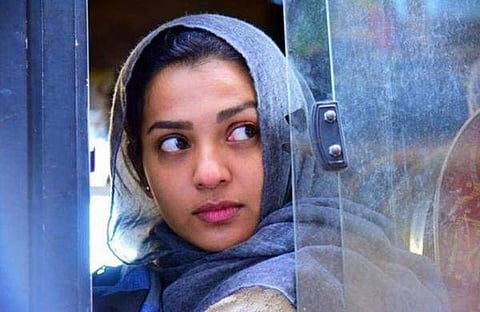Varthamanam Movie Review: A bold, fearless film that wants you to speak up
Rating:(3.5 / 5)
Varthamanam is one of the angriest films I've seen, and rightly so. But it's not any 'mass' dialogues that make it so. Instead, it shows you some of the things about this country that make your blood boil.
Faiza Sufiya (Parvathy), a Malayali, arrives at Delhi University to enrol as faiaa research student. Her subject is Mohammed Abdur Rahiman Sahib, a freedom fighter and journalist who may not be as familiar to the general public as Mahatma Gandhi. In fact, a scene towards the end reflects this sentiment. Varthamanam isn't about the shocking attacks at JNU, but it addresses every problematic issue plaguing this country by making the university a representative.
Director: Sidhartha Siva
Cast: Parvathy Thiruvoth, Roshan Mathew, Siddique
Amal (Roshan Mathew) is the student union leader protesting the discrimination of his Dalit roommate. Faiza, too, is sharing her room with a Dalit student. Amal's gang consists of a diverse group of characters. (I suspect one of them is the alter-ego of the director, Sidhartha Siva.) Then comes the right-wing student group, which has a problem with South Indians in general, except for the Malayalis in their gang. They aim to thwart Amal's anti-fascist movement, which Faiza is also now part of. Despite its anti-capitalist sentiment, the film doesn't generalise all those who come from affluent families. Interestingly, one member of Amal's gang is the rebellious son of an industrialist.
Faiza's alliance with Amal doesn't sit well with the saffron gang and also those of her religion who want to further that particular cause and make attempts to push her to their side. But this is a woman with so much clarity and individuality — a character tailor-made for someone of Parvathy's stature. Faiza doesn't want to let fundamentalism dictate the direction of her goal. Siddique plays a Malayali professor who backs Amal and Faiza. (Aishe Ghosh may have been the inspiration for both.) He urges them to be even more aggressive. He has an interesting background too. He is revealed as someone hailing from an affluent family who got ostracised due to his ideology. Faiza, on the other hand, has all the support of her family members. Her freedom fighter grandfather being one of them. Oddly enough, we never get to know anything about Amal's family.
And as much as I loved the film's intention, I found the theatrical nature of some portions off-putting. There are times when the actors look like they are part of an awareness video. For instance, an interaction between Parvathy and Siddique, after an informative speech from the latter, sounds a bit artificial. He is narrating an episode from history, and she replies something to the effect of, "Oh. I didn't know about that. Yes, it's true." Or how about the scene where she asks him, "Aren't we going to Jamia Millia?" which is a cue for Siddique to give a history of the university and how one political party played a big part in it. (This last scene, in particular, seems like a subtle attempt at propaganda.)
I was also bothered by a couple of interactions that may have sounded good on paper but looked forced on screen. When the professor's wife talks about the improvement of the economy post-demonetisation, it's a cue for Amal and his friend to break out their argument about how the loans of the giant Indian industrialists are waived but not that of the struggling students and farmers. It sounds like something straight out of a college debate competition. While I like the idea of including these conversations in the film, they would have looked better elsewhere. But one can also easily overlook them considering what the film stands for.
It's the voice of the film that matters more than anything else. Varthamanam is a wake-up call for those who have been ignorant or silent for far too long - or for those who have the fire inside but are not loud enough. The casting of Parvathy and Roshan makes perfect sense. An emotionally overwhelming moment where Faiza speaks to reporters wouldn't have been as effective if someone else had done it. And Roshan's theatre background comes in handy when Amal and gang plan an anti-fascist play. (Gauri Lankesh becomes a character in their play when they learn about her assassination.) Roshan is very convincing as the man who has enough vigour and fury to inspire a massive crowd.
Another notable aspect of Varthamanam is its visual style which never includes the flashier side of Delhi. It picks up some of the less glamorous areas for the characters to move around in. It got me thinking of those World War-II films about the French resistance, especially after one of the main characters in Varthamanam goes on the run from the cops allied with the fascist powers. It was only recently that we saw attempts to silence the voices of some of the most influential members in media. Varthamanam tells you that the freedom struggle isn't over yet and that we may be dealing with a far bigger threat this time. And it wants to know what are you going to do about it.

